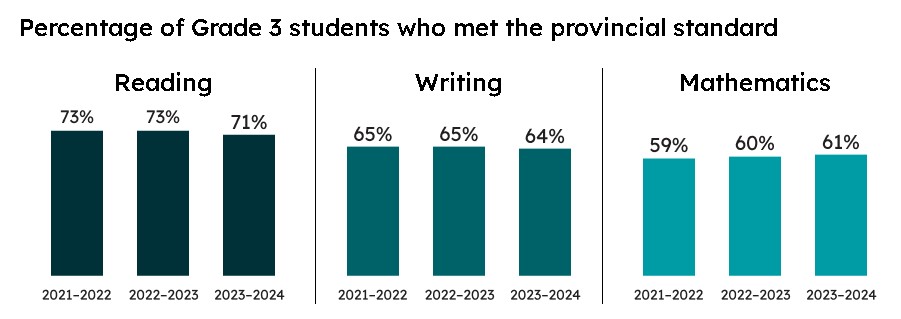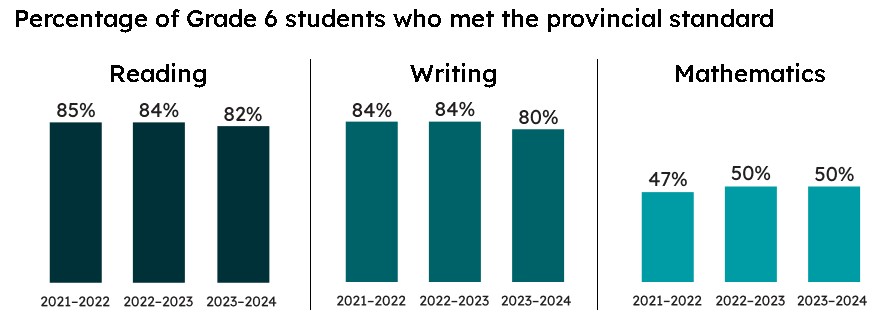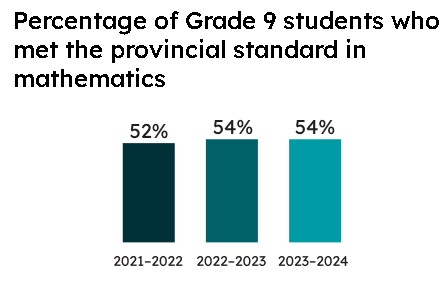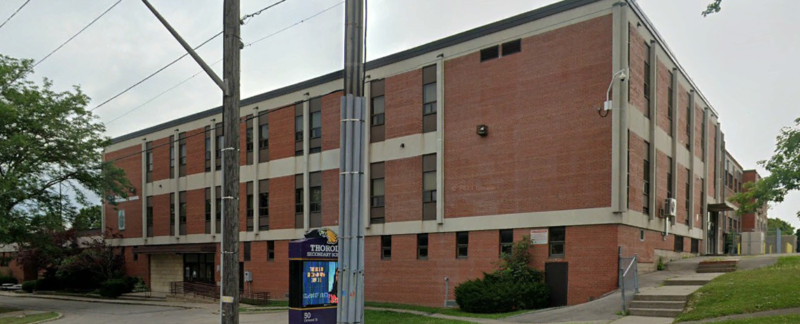It is hard to ignore the glaring issue facing our schools in St. Catharines and the Niagara Region. A significant number of schools are underperforming, and in some cases, failing outright. This is not just a case of a few schools struggling, it is a systemic problem that points directly to the failures of the District School Board of Niagara.
The numbers do not lie. St. Catharines Collegiate Secondary School is ranked 682 out of 689 schools in Ontario, with a shockingly low score of 0.8/10. That is right—0.8 out of 10. This places the school almost at the very bottom of provincial rankings, almost as though it is been forgotten by the DSBN entirely. And it is not alone. Stamford Collegiate Secondary School in Niagara Falls is not far behind, ranking 671 out of 689 with a score of 1.8/10. These schools ARE failing our children, plain and simple.!
But it is not just these two schools. The list of underperforming schools in the region is alarmingly long. Eastdale Secondary School (666/689) in Welland has a dismal score of 2.1/10, and Thorold Secondary School (615/689) comes in at 3.7/10. Even Port Colborne Secondary School (562/689) scoring 4.5/10, struggles to rise above the mediocrity plaguing our region.
In total, 7 schools of the DSBN’s 16 secondary schools (44%) in the Niagara Region score less than half of the possible points on provincial evaluations. 7 schools! Think about what that means for the students attending those schools. They are at an incredible disadvantage, receiving an education that leaves them ill-prepared for the future. This is not just about number, it is about the futures of thousands of young people in our community who deserve better.
The fact that so many schools in our region are performing so poorly is a direct reflection of the DSBN’s failure to provide the necessary resources, support, and accountability. There is simply no reason why schools in St. Catharines and surrounding areas should be ranking at the bottom of the province. It is a dereliction of duty on the part of the DSBN, and it is time to demand change!
. . . . .
No More Excuses: The Ontario School Systems Responsibility for Failing EQAO Scores
The EQAO (Education Quality and Accountability Office) scores in Ontario paint a grim picture of the state of education. Year after year, we see poor and unacceptable results, particularly in critical areas like mathematics and writing, and i is clear that the Ontario government and the DSBN are failing our students. COVID-19 may have been an acceptable reason for disruptions and poor performances in education in previous years, but it is no longer a viable excuse. The DSBN and eevry other school have had ample amounts of time to adjust and recover, yet the results tell a different story. The education system is St. Catharines and in the province is broken, and it is the responsibility of the school boards to fix it.
GRADE 3
Starting in Grade 3, we see a stagnation in reading and a worrying decline in writing and math skills. Reading scores have barely budged, staying at 73% for two consecutive years before inching up to 74% in 2023–2024. However, the writing scores are particularly concerning, dropping from 65% in 2021–2022 to 64% this past year. Similarly, mathematics remains a weak point, with only 61% of Grade 3 students meeting provincial standards, even after three years of minimal progress.

By Grade 6, the pattern is no better. Reading scores are dropping from 85% in 2021–2022 to 82% in 2023–2024, while writing scores have seen a steep decline from 84% to just 80%. The situation in mathematics is even more distrubing. With only 50% of students passing, this is not a recent issue. It is a chronic long term failure in our education system history that must be addressed immediately.

The problems continue into high school, where Grade 9 mathematics scores have barely improved. From 52% in 2021–2022 to a mere 54% in the past two years, it is clear that the current Ontario education system is not preparing our children for success in one of the most essential subjects for future academic and career opportunities.

Despite the challenges posed by COVID-19, schools have had more than enough time to recalibrate and address these educational shortcomings. Remote learning and other pandemic-related disruptions may have initially set back students, but the persistence of these poor results years after the fact indicates a deeper, more systemic issue. Blaming COVID is a convenient excuse, but it does not hold up under scrutiny anymore. The responsibility for these failures lies squarely with the Government of Ontario and the school boards itself.
School boards, including the District School Board of Niagara, must acknowledge their failure to provide the resources, support, and accountability necessary for student success. The stagnation in scores, particularly in writing and mathematics, shows that their current strategies are not working, and many children are being left behind.
Ontario schools have received substantial government funding, yet the return on that investment is dismal. Whether it is outdated teaching methods, poor resource allocation, or a lack of focus on foundational skills, the responsibility falls on the school boards and the administrators who have allowed these trends to persist. It is no longer acceptable to shift the blame elsewhere.
These reporting of poor EQAO results should again serve as a wake-up call for every parent and everyone involved in education system, this is a crisis that needs urgent attention. The future of thousands of DSBN children depends on it.
The DSBN must be held accountable for their chronic underperformance, and it is high time for the DSBN system to prioritize effective solutions, including better teacher training, updated curriculum standards, and targeted interventions for struggling students.
The future of Ontario’s studentschildrens educationl is at stake, and the time for excuses is over. It’s time for real, systemic change.
. . . . .
The District School Board of Niagara receivied a substantial $631 million from the government for their budget for the 2024-2025 school year, with most of the funding coming from the Ontario governments Grants for Student Needs program.
And here we have issues that cocntiuiue ti persist around poor resource allocation and underperforming schools. The lack of transparency and accountability in how these funds are being used highlights the need for change. This is where the Transparency and Responsibility Audit Committee for Education (T.R.A.C.E.) comes in—ensuring oversight, demanding improvements, and addressing the long-standing educational failures ignored by current representatives like Chris Bittle.
We need an independent body urgently to hold the District School Board of Niagara accountable for the state of education in our region. The current framework allows the DSBN to self-regulate which has created a lack of accountability and oversight.
As a result, the system remains stagnant, with no incentive to address its own shortcomings. Every year, the DSBN receives substantial government funding, yet this money is often spent irresponsibly, without transparency or concern for the long-term impact on our schools and students. It’s time for a more accountable and responsible approach to education governance.
T.R.A.C.E. would ensure that:
- Monitoring Behavioral Standards: Evaluating DSBN policies, practices and behaviours related to equity, diversity, and inclusion, and ensuring adherence to anti-racism commitments.
- Monitoring Student Performance Standards: This independent public oversight committee will review St. Catharines student performance on the Ontario Standardized Testing (O.S.T.) and will also evaluate teacher performance for the Teachers Incentive Program (T.I.P.) on an annual basis.
- Auditing Financial Practices: Review annual budgets, expenditures, and financial decisions to identify areas of improvement, ensure compliance with fiscal policies, and promote responsible spending.
- Reporting and Transparency: Providing regular reports to the community on findings and recommendations to enhance transparency and accountability within the DSBN.
The DSBN has failed its duty to provide the quality education that our children deserve. Year after year, too many schools in our region continue to rank below provincial standards, depriving students of a fair chance to succeed. This is unacceptable, and it is our responsibility to demand better. The future of St. Catharines, Welland, Thorold, and other surrounding areas depends on ensuring every child gets the education they need to thrive.
That is why we need T.R.A.C.E. — the Transparency and Responsibility Audit Committee for Education. T.R.A.C.E. would hold the DSBN accountable, investigating how tens of millions in government funding are spent and identifying why so many schools are failing. This is about exposing inefficiencies and ensuring that resources reach the classrooms and students who need them most.
Chris Bittle, as our local MP, has shown no interest in addressing these critical issues. His lack of action on the poor performance of schools over the years within his own district suggests indifference toward the future of our children. We cannot continue to allow complacency in leadership, nor can we allow these problems to persist unchecked.
Our childrens futures are on the line, and they deserve better than to be left at a disadvantage because of mismanagement or neglect. It is time to demand transparency, accountability, and real change. With T.R.A.C.E., we can take a crucial step toward ensuring that every student in our community receives the quality education they deserve. The time for change is now—our children, our schools, and our future depend on it.

